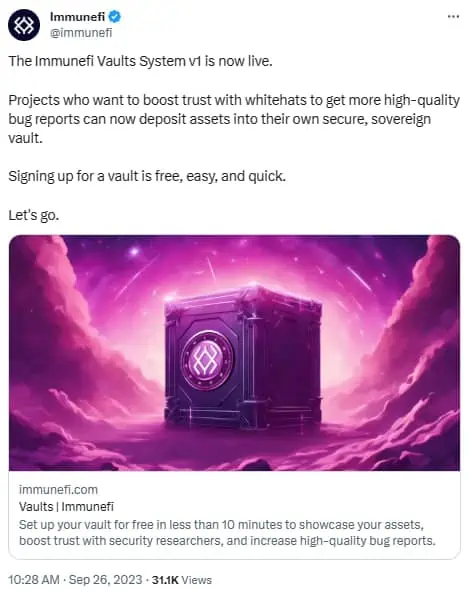
Immunefi’s new vault system enables faster and easier interaction with ethical or white hat hackers.
Projects that seek to establish a collaborative relationship with ethical hackers, also called hackers white hat, can now store assets in their own vaults through the Immunefi Vaults System service.
Recently launched, Vaults System is a vault solution that allows projects to interact and reward ethical hackers quickly and transparently, to Encourage vulnerability detection and detailed reporting high impact.
Through Vaults System, developers and project administrators can reward hackers white hat autonomously, without having to rely on intermediaries or centralized platforms to do so. All this thanks to the fact that vaults allow projects to display the assets available for their bug bounty programs, to reflect their commitment to improving project security and strengthening trust in the blockchain ecosystem.
What is Immunefi Vaults System?
Vaults System is the new service developed by Immunefi to offer asset vaults that projects can use to offer rewards to hackers for finding existing bugs in the code of their smart contracts and decentralized applications.
As Immunefi explains, these vaults make it easier for projects to set up payments, saving gas fees, to pay security researchers to review code, detect bugs or errors, and disclose vulnerabilities through accurate reporting.
The Immunefi platform also highlighted that through the Vaults System service, projects can build more trust with security researchers, to obtain top-level bug reports and thus contribute to making the cryptocurrency and blockchain ecosystem increasingly secure.

Immunefi is a platform focused on rewarding the detection of code errors in the blockchain and Web3 industry. According to its official website, this platform offers the largest rewards in the ecosystem, with more than $80 million paid to hackers. white hat and $156 million in rewards available.
Some of the projects that have used Immunefi to strengthen their security level are MakerDAO, Reserve, GMX, SmarDex and LayerZero, among others.
Encouraging the practices of Ethical Hacking
In a global market where new users and investors are added every day, it is important to guarantee the security of both users and their funds.
To date, several major projects in the DeFi ecosystem have fallen victim to exploits and vulnerabilities, such as Mixin Network and Curve Finance. These hacks have resulted in the loss of several million dollars in funds, thus encouraging the practices of ethical hacking It is essential to minimize risk and ensure asset protection.
On its official website, Immunefi highlights that through the Vaults System its objective is to “fostering a culture of collaboration between security researchers and cryptocurrency projects, offering fair rewards and learning opportunities".
Immunefi’s vault system allows projects to store their funds securely and transparently, using the Safe multisig smart contract, which has been widely tested and audited in the ecosystem. In addition to this, Immunefi has its own bug bounty program, which incentivizes ethical hackers and security researchers to report any issues they find within its system, thus ensuring maximum security and protection.
Hackers white hat They are cybersecurity experts who use their knowledge and skills to detect and disclose errors and vulnerabilities in systems and networks, in order to protect them from potential malicious attacks. These hackers usually report the vulnerabilities they find to the people responsible for the affected projects, so that they can implement a solution.
Continue reading: Polygon Network and De.Fi join forces to strengthen security on Web3



